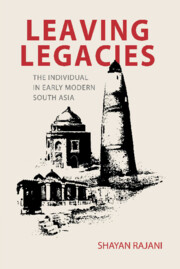Introduction
Published online by Cambridge University Press: 28 November 2024
Summary
WRITTEN ON A STONE AT A SPRING
Babur, the first king of the Mughal Empire, spent much of his early life wandering Central Asia. Though a Timurid prince, he was without a kingdom to rule. In 1501, after losing Samarkand to the Uzbeks for a second time, the nineteen-year-old found himself in the Matcha Hills. At a spring by a shrine, he inscribed the following lines (Image I.1):
I have heard that glorious Jamshed wrote on a stone at a spring,
“Like us many have spoken over this spring, but they were gone in the twinkling of an eye.
“We conquered the world with bravery and might, but we did not take it with us to the grave.”
The words are scratched into rock in a rough and uneven hand, without much evidence of considered design, and signed by Babur. Perhaps, these were the actions of a downcast prince, spurning power that felt beyond his grasp. It may be that he was seeking morbid comfort in the transience of life and the certainty of death.
However, the words of the ancient Persian king, Jamshed, quoted in the inscription, are more than a reflection on the futility of worldly accomplishment. They are an instruction to attend not to what one can take beyond death but to what one can successfully leave behind. Speech and conquest are ephemeral acts—“gone in the twinkling of an eye”—particularly in contrast to geological time immanent in the spring. In inscribing the verse, Jamshed introduces writing as another form that endures. It stays constant like the spring and constant by the spring. The longevity of the inscribed words is put in service of a literary reflection on transience, whose lesson returns the reader to the material visualization of the enduring nature of writing. By Babur's time, Jamshed's kingdom had long turned to dust. Yet these words, first carved in stone, persisted. If nothing can be taken to the grave, then Babur's act of leaving an inscription was not an admission of defeat, or a resignation to namelessness, but rather the resolve to leave behind something more enduring than conquest—a remainder, a reminder, a legacy.
- Type
- Chapter
- Information
- Leaving LegaciesThe Individual in Early Modern South Asia, pp. 1 - 25Publisher: Cambridge University PressPrint publication year: 2025

